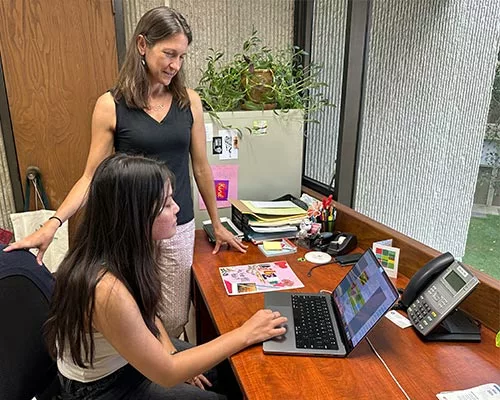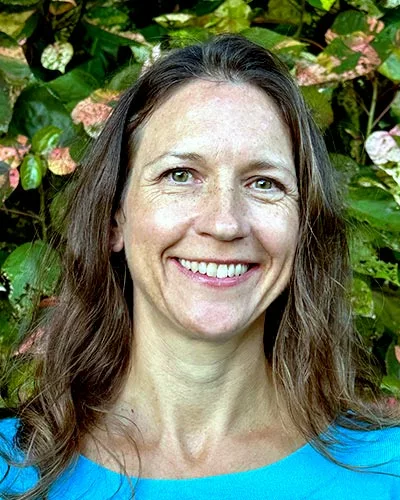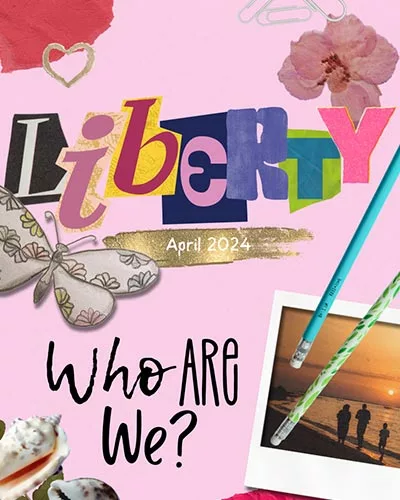“I’m from dirty seed and hidden misdeeds
More meat for the grinder society bleeds
I lay low, recovering in the weeds
Knowing I’m meant to do more than feed the machine.”
– Newsletter contributor, Hawaiʻi Women’s Community Correctional Center
Colleen Rost-Banik has a theory about the incarcerated: They lead complex lives. The full-time Sociology instructor in the College of Social Sciences said “these individuals – prior to entering the criminal justice system – have experienced abuse or trauma.” Also, many have been incarcerated for crimes resulting from core social problems like poverty, addiction and mental illness.
“When it comes to crime, our society has been really slow to put what we know about human behavior and social issues into practice,” said Rost-Banik, who joined UH Mānoa in 2023 after teaching at Windward Community College. “How do we expect people pushed out of formal schooling, who aren’t able to find living wage jobs with healthcare benefits, and who are responsible for taking care of their children, to shoulder their stress without turning to substances or illicit work?
“Rather than addressing the root problems of society that lead to crime, our society has implemented heightened policing and harsher sentencing. This significantly increases incarceration nationwide as well as in Hawaiʻi, with Native Hawaiians and Pacific Islanders disproportionately represented in our jails and prisons.”
This sociological imbalance was a prime motivating factor behind the April 2024 newsletter Liberty: Who Are We? It is filled with poetry, art, quotes, testimonies and general creativity produced by the Contributors, about 11 residents at the Women’s Community Correctional Center (WCCC) in Kailua. According to the website, “WCCC is the only women’s prison in Hawaii.”
While the Contributors were the newsletter’s authors and artists, the publication’s editors or Assemblers were Rost-Banik’s Spring 2024 students in the Women and Crime class, cross-listed as SOC/WGSS (Women, Gender and Sexuality Studies) 435. About a third of the class, or 10 students, participated.
“Creating and publishing art is a privilege. Our group had infinite access to everything we could ever want, but our authors don’t,” said Assembler Clarisa Wegesend. “Simple daily items such as pen and paper are taken away from them, limiting their creation to certain hours or days of the week. And these works, most likely, never would have been published unless people with privilege – like our professor and group – decided to work on it. This begs the question of when did we start viewing art as a privilege?”
It was no easy process for Rost-Banik to manifest the newsletter into reality, although similar projects had been approved before in Hawaiʻi by other ambitious instructors. At UH Mānoa in January 2023, Rost-Banik had worked with WCCC to start a voluntary, non-credit creative writing class. A year later in January 2024, the newsletter idea was embraced by her Women and Crime class, thanks to formal approval from the state Department of Corrections and Rehabilitation, and WCCC warden and chief of security.
Since publication, more WCCC Contributors have joined the creative process, especially after a spoken word artist recently visited and inspired them. “What moved me is how incredibly talented and thoughtful everyone was,” said Rost-Banik. “The Assemblers wanted to make sure that WCCC student voices were at the center of the project, and I think they succeeded. And the Contributors wanted to be known for more than a crime.”
Plans are to continue publishing and distributing the Liberty newsletters, with the help of UH Mānoa student volunteers. “This project really helped make the theories, concepts and criminal justice trends that we studied in class come to life,” said Rost-Banik. “The student Assemblers felt like they were helping to amplify some of the voices from inside prison – perspectives that all-to-often aren’t even heard by many on the outside. The Contributors felt that the newsletter helped convey their creativity, sense of humor and deep compassion for those around them, despite living in really harsh conditions. It really was a humanizing project.”
For more information, send an email to wccclibertynews@gmail.com.
See the first April 2024 newsletter
See the second August 2024 newsletter
“It’s dangerous being a foster kid in the richest, greatest superpower of the world. Where 8 out of 10 are sure to end up DEAD, HOMELESS, and in our PRISONS . . . These odds have held strong since I’m sure the system was put into place. For many, many years, I know and will continue to be carried on by society until the end of time. Or until society can get a clue that something is up, that there’s more to life than you’re probably willing to look at. So please be careful when you look at me. And I mean that.” – Newsletter contributor, Hawaiʻi Women’s Community Correctional Center


